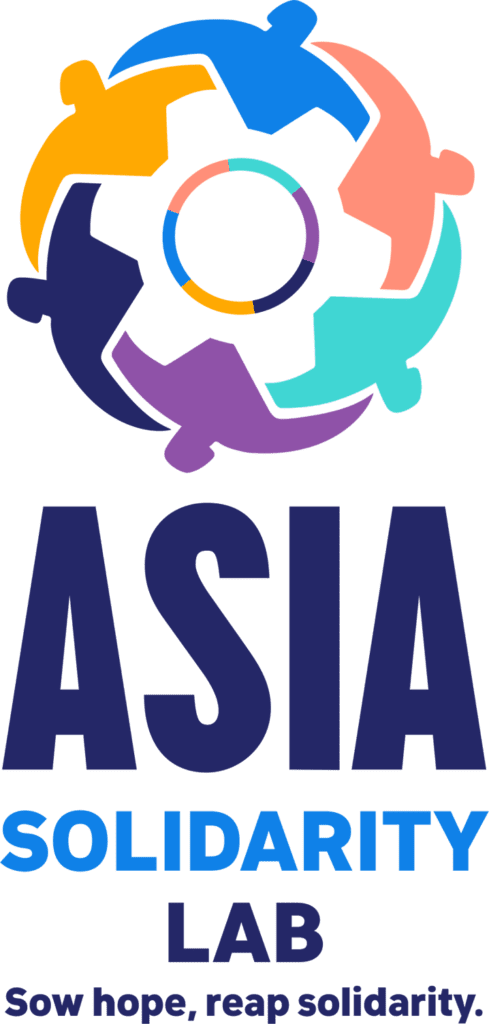Manifesto
The Asia Solidarity Lab Manifesto
In the spirit of sowing hope and reaping solidarity, we the participants, co-hosts and partners of the Asia Solidarity Lab are coming together today as one people’s movement to call for a just recovery that puts people and planet at the heart of post-pandemic action.
With the COVID-19 pandemic disproportionately affecting the already marginalized and the climate crisis intensifying sharp inequalities all over the world, movements everywhere have been working hard to re-center ourselves and collectively link up to build people power. During the Asia Solidarity Lab, we came together to explore how we can genuinely stand in solidarity with each other’s fights, uplift local struggles and unite our calls towards regenerative movement-building for the good of all.
We recognize that the work is never finished, and that these demands represent only a share of the work that needs to be done. Nevertheless, we are committed to continuing to build people power through intersectional organizing and movement-building, recognizing that our struggles and solutions are linked and campaigning for justice on all fronts.
Taking guidance from our frontline and impacted communities, Indigenous groups, marginalized sectors and youth, we call on governments at all levels to:
The Asia Solidarity Lab Manifesto
In the spirit of sowing hope and reaping solidarity, we the participants, co-hosts and partners of the Asia Solidarity Lab are coming together today as one people’s movement to call for a just recovery that puts people and planet at the heart of post-pandemic action.
With the COVID-19 pandemic disproportionately affecting the already marginalized and the climate crisis intensifying sharp inequalities all over the world, movements everywhere have been working hard to re-center ourselves and collectively link up to build people power. During the Asia Solidarity Lab, we came together to explore how we can genuinely stand in solidarity with each other’s fights, uplift local struggles and unite our calls towards regenerative movement-building for the good of all.
We recognize that the work is never finished, and that these demands represent only a share of the work that needs to be done. Nevertheless, we are committed to continuing to build people power through intersectional organizing and movement-building, recognizing that our struggles and solutions are linked and campaigning for justice on all fronts.
Check the full Manifesto at asiasolidaritylab.org
In the spirit of sowing hope and reaping solidarity, we the participants, co-hosts and partners of the Asia Solidarity Lab are coming together today as one people’s movement to call for a just recovery that puts people and planet at the heart of post-pandemic action.
With the COVID-19 pandemic disproportionately affecting the already marginalized and the climate crisis intensifying sharp inequalities all over the world, movements everywhere have been working hard to re-center ourselves and collectively link up to build people power. During the Asia Solidarity Lab, we came together to explore how we can genuinely stand in solidarity with each other’s fights, uplift local struggles and unite our calls towards regenerative movement-building for the good of all.
We recognize that the work is never finished, and that these demands represent only a share of the work that needs to be done. Nevertheless, we are committed to continuing to build people power through intersectional organizing and movement-building, recognizing that our struggles and solutions are linked and campaigning for justice on all fronts.
Check out for more details at the asiasolidaritylab.org
1
Build back our economies better by centering well-being for all – taking leadership from workers, vulnerable communities, frontliners and the youth.
Our dominant global economic system incentivizes growth and destruction at any cost in the name of profit. We need to dismantle this system that not only enables, but incentivizes oppression and abuse — from keeping developing nations under debt traps, to undermining social services and eroding human rights in the name of private profit, to being responsible for climate destruction.
We need instead to prioritize the collective well-being of people and planet. We need to restructure current economic systems by forging new alliances, and channel investments towards a complete transformation, designed by workers, communities and vulnerable populations to promote a just transition from the ground-up that upholds human rights, and centers economic, gender, health and climate justice and self determination.
2
Shift financial flows away from fossil fuels in our just transition towards renewable energy and invest in community-based solutions.
On top of fossil fuels dominating the energy mix, the increasing private financing of energy production as well as public financing for dirty energy diminishes capacity for accountability and signals the refusal of governments to address problems with decisions surrounding climate action.
To protect our planet from the worst impacts of the climate crisis we need to transform our energy dependence on fossil fuels to power our society and economy by shifting financial flows away from dirty energy projects and promoting investment in community-based sustainability solutions that immediately benefit communities confronting the impacts of climate change; and building climate solutions for an economy free of fossil fuels.
3
Uphold the rights of individuals and communities to lead lives free from physical and mental health hazards inflicted by both the COVID-19 pandemic and environmentally destructive systems by ensuring access to a people’s vaccine and robust healthcare.
We need to be cognizant now more than ever of the fact that already fragile health systems were devastated by the COVID-19 pandemic, and those bearing the brunt of that collapse are those already marginalized including women, girls, and non-binary people, especially those without class privileges.
The continued privatization of healthcare, especially of the COVID-19 vaccine, further intensifies long-standing inequalities. We demand health protection and vaccine justice for everyone, not only those who can afford the steep price tags of care. We need to prioritize public health over private profits.
4
Uphold the rights of individuals and communities to the full and free expression of their gender identity, sexual orientation, and bodily autonomy with freedom from fear, discrimination and marginalization.
We are facing a global anti-gender backlash that is well-organised and supported by authoritarian governments, conservative religious entities, and greedy corporate powers. These elements are inextricably linked under a neoliberal capitalist economic system characterised by rent-seeking and extraction in which labour is subservient to capital, creating the conditions for exploitation of people and damage to the planet. The virulent transnational anti-human rights phenomenon that thrives under this system is spearheaded by fascistic and paternalistic actors, and woven through with neocolonialism, racism, xenophobia, ableism, and classism. Women and LGBTI+ people, especially trans people, face unrelenting attacks on our gender identities, sexual orientations, and bodily autonomy in the name of upholding reactionary values and prioritising profit.
Untold harm is caused by the anti-gender movement’s pressure to punish those who do not conform to rigid expectations of gender expression, sexuality, and gender roles. We must unwaveringly oppose these oppressive and violent infringements in all their forms, including conversion therapy and genital mutilation, as factors that prevent the attainment of people’s bodily autonomy. We also recognise the evolving capacities of young people for self-determination, and call for duty bearers to provide comprehensive sexuality education and specific gender-responsive/transformative programmes that address sexual and gender-based violence.
5
Take concrete action to defend environmental defenders from repression and different forms of civil and political human rights violations that hinder their work in upholding our environmental rights to a healthy and balanced ecology, and to have access to information, justice, and public participation.
In 2019, 29% of environmental defenders killed were in Asia, according to the 2020 Global Witness report. Most of the killings were related to opposition to mining, extractives, and agribusiness operations. Both state security forces and private corporations were involved. Aside from killings, environmental defenders have also experienced harassment, threats, intimidation, physical assault, illegal arrests, criminalization, and red/terror-tagging among others. Most of these are reprisals for their advocacy and the attacks have intensified under the pandemic. They are projected by governments and corporations as enemies or anti-development as justification for the attacks. These have hindered their important work in protecting the environment, upholding our environmental rights, and achieving social and climate justice.
We call for impartial and comprehensive investigation, accountability and justice for the human rights violations. In addition, policies and programs should be in place to ensure the protection of environmental defenders as well as a safe and enabling environment for them to engage in their advocacy.


